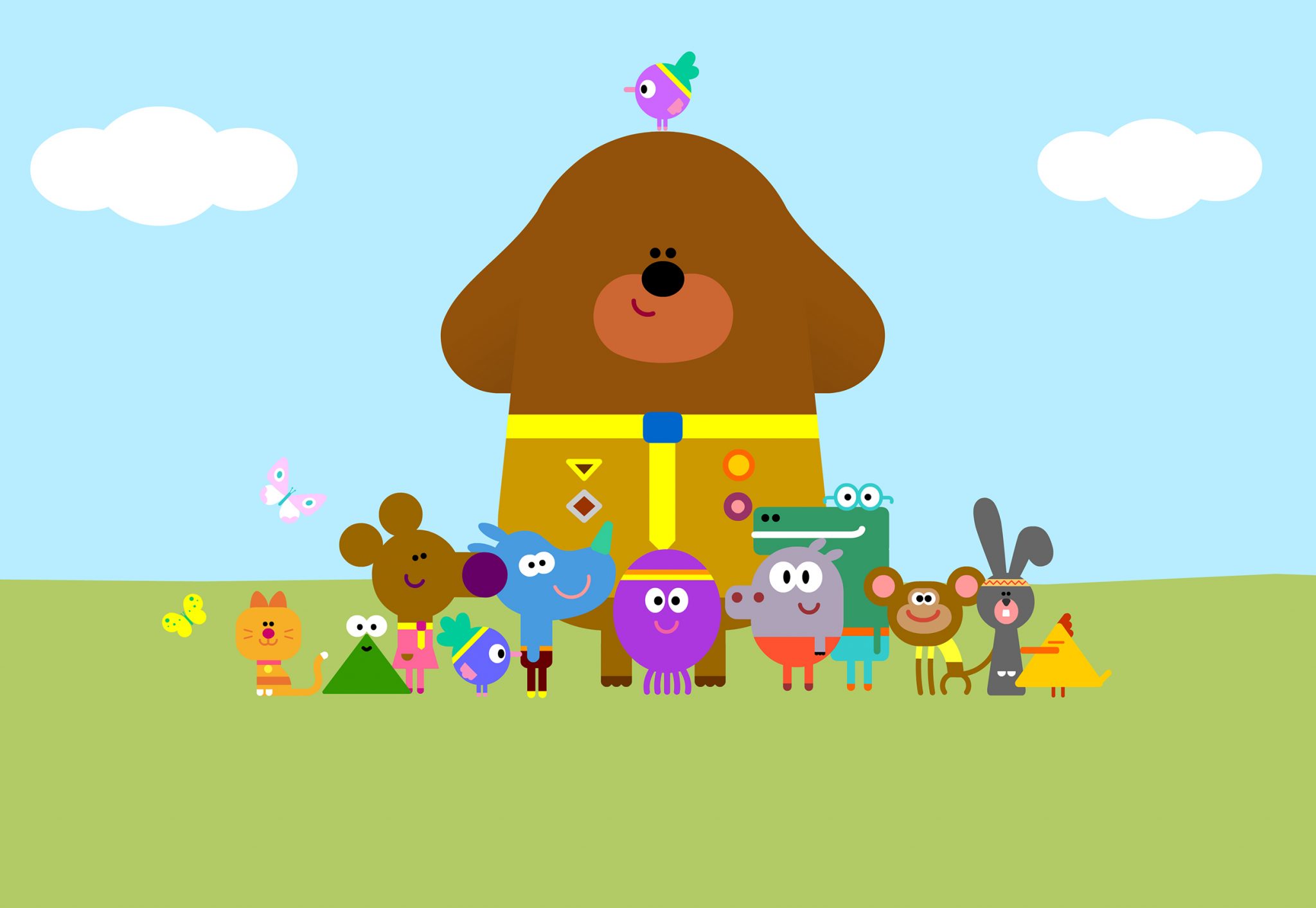How the atomisation of COVID-19 lockdowns has created a fear of the new – even in the world of CBeebies connoisseurs
Parenthood is a transformative experience: it involves a complete reorientation of the self, towards this new life that you are now responsible for. It can be hard to remember what things were like beforehand. What did I even do on the days off I used to have, I find myself thinking sometimes. How did I fill that immense superfluity, of excess, untoddlered time? And why wasn’t Hey Duggee (2014-) playing in the background?
My almost-two-year-old son will allow us to play exactly three things on the TV when he is in the room. These are: Pointless (2009-), which he always watches when he gets home from nursery; University Challenge (1962-), which for some reason he finds hilarious; and Hey Duggee. Other shows for adults make him antsy; other shows for children instigate a fit of howling rage. So mostly, we watch Duggee. As a parent, I have never seen Peppa Pig (2004-); I have little conception of what PAW Patrol (2013-) is about. I often hear mention of a Bing (2014-) – no clue what a ‘Bing’ is, to be quite honest with you. Our house is, thankfully, untroubled by ‘Kid’s YouTube’. But I am intimately familiar with Hey Duggee.
I know every character, and the names of the voice actors who play them. Some of the characters are voiced by different actors in different episodes – I can tell by ear who’s doing it each time. Sometimes I hear the episodes just sort of unfold verbatim in my head when I’m not watching it, like a song that’s got stuck there. Hey Duggee bookends the day: it helps my son face breakfast, and occupy the dead time before his bath. During the worst of the winter lockdown, drowning and helpless with no real good way of balancing childcare and work, we’d sometimes let him have it on all day. There have been times when we’re in the park, when he’s having fun, that my son has started singing the theme song to himself: the best way to proclaim the joy he knows.
Apparently BBC iPlayer received 67 million requests to play episodes of Hey Duggee during the first UK lockdown. I’m worried they might all have come from our household.
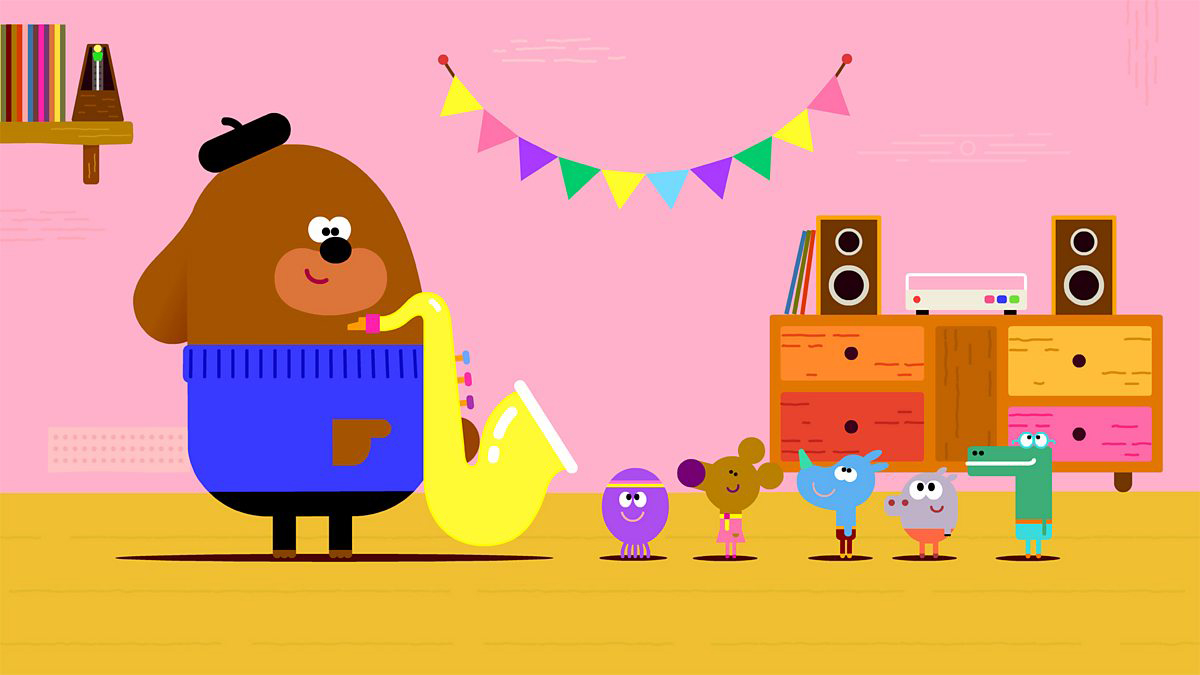
I have no idea why my son has such an immensely strong preference for Duggee. But perhaps it’s just impeccable taste. Most of the other shows aimed at pre-schoolers that I have seen (however briefly) have been dross. And even if they weren’t – it’s hard, honestly, to conceive of a better kids’ show than Hey Duggee. The basic premise is this: five wee kids, each of them a different animal, all very much human, attend the ‘Squirrel Club’, a sort of nursery-cum-scout group, overseen by the titular Duggee, a large dog in a uniform, who only communicates in woofs. In every episode, they have an adventure, or learn a new skill, which results in them earning a ‘badge’ (so: they get their ‘Tooth Brushing Badge’, or ‘Being Quiet Badge’, or whatever – obviously the lessons don’t all immediately translate to in-real-life).
The animation is bright and distinctive – and done in Flash, which for millennial parents raised on early noughties internet cartoons, lends it a nostalgic tone. Thankfully, the animation is practically the only thing that Duggee has in common with Salad Fingers (2004): the world the Squirrels explore is quirkily nice and inclusive, populated by characters such as Naughty Monkey, a hootingly anarchic banana enthusiast and antiques dealer (who inhabits a gorgeously furnished mid-century apartment), and Mr and Mr Crab, a gay crustacean married couple.
The show is also remarkably un-dumbed down. The Squirrels explore topics such as Philosophy (where mention is made of the Categorical Imperative) and Art (complete with references to Botticelli, David Hockney, and those pictures of the dogs playing poker). In one episode (‘The Fashion Badge’, 2017), they even use the word ‘deconstructing.’ When I was an undergraduate, I went on University Challenge, and did quite well – but over the course of filming the series, I realised that almost everything I knew, I knew from The Simpsons (1989-). It is just about possible to imagine something similar happening with my son and Hey Duggee. Thanks to Duggee, the plot and a lot of the shots will seem eerily familiar, if he ever happens to watch Independence Day (1996) or Apocalypse Now (1979), both of which have received episode-long parodies for some reason.
All of which is to say: it was very exciting to see, at the start of April, six new episodes of Hey Duggee uploaded to BBC iPlayer – the first new Duggee (barring a one-off Christmas special) since last June’s ‘The A Capella Badge’ , which I think emerged around the start of lockdown one. Finally, we thought: as the world thaws, or at least the world around us does, we will have something new… to play over and over again on repeat!
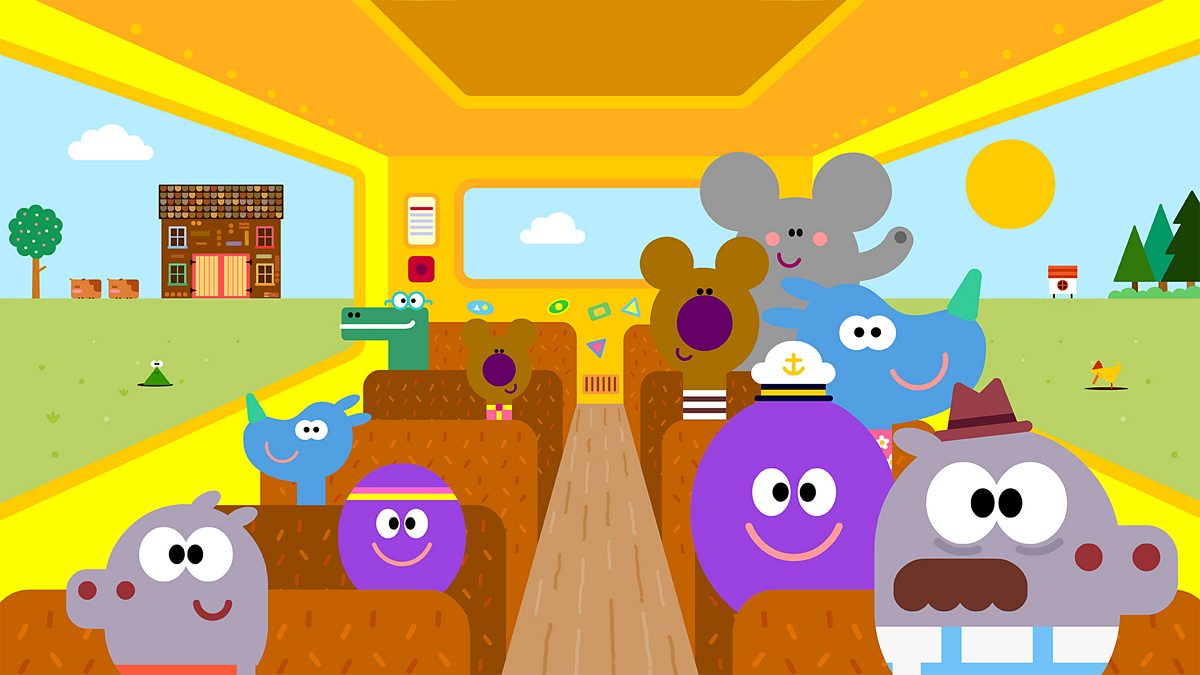
To the disinterested viewer, the new episodes might seem like typical Duggee fare. Quirky adventures like ‘The Babysitting Badge’ and ‘The Bridge Badge’ sit along experiments in form (‘The Comic Badge’, which sees the Squirrels designing their own comic) and episodes teaching kids how to behave nicely towards one another (‘The Diplomacy Badge’). New Squirrel Club voice actors Forrest Davis (replacing Duke Davis as Happy) and Arabella Duffy (standing in for the peerless Jasmine Bartholomew as Betty) acquit themselves well amidst the established cast. None of the episodes quite manage to hit the heights of the all-time greats (2019’s ‘The Tree Badge’, 2020’s ‘The Game Show Badge’), and none contain a song as uproariously banging as ‘The Stick Song’ or ‘The Singing Song’. But that doesn’t matter too much: it’s still Duggee, it’s still better than everything else on CBeebies. Of the new episodes, the best is probably ‘The Senses Badge’ – a lovely little episode which attempts to treat children how to be phenomenologically attentive to their world. The animation shows the Squirrels getting ‘closer’ to the objects they experience, seeing them in finer grain as they attend to all five senses.
But to a more deeply invested viewer, it is obvious that the six new episodes are united by a central failing: they are all utterly terrifying. When you are first exposed to them, you will run horrified to your caregivers; you will clutch your mother and revert to the breast, damp with floods of awful tears. Over time, you will learn to be able to look at them – but only by nestling in your parents’ lap silent and still, your little heart thumping with force enough to escape your chest. If they ever accidentally come on, you will reach for your monkey to give him a cuddle. You may never love these Duggees: they must only be reserved for special occasions, when we are being very brave; they cannot be allowed to autoplay.
There is something about them, it seems, that is completely uncanny. To the untrained eye, these new episodes are, as I say, Hey Duggee – but as an expert, you know better. When you watch Hey Duggee, you know what is going to happen: you know every little rhythm, every minor tonal lift and fall. You know, on BBC iPlayer, which episode is going to come up next, from the thumbnails: when ‘The Water Badge’ is loading, you make your sound that means ‘water’; when ‘The Toothbrushing Badge’ is about to play, you proudly announce: ‘teeth, teeth.’ But with these Duggees, you can’t do that. It is like induction has been somehow broken: like a new day has arrived, according to the clock, but the sun is refusing to rise. They are new. And you no longer really feel quite comfortable processing new things.
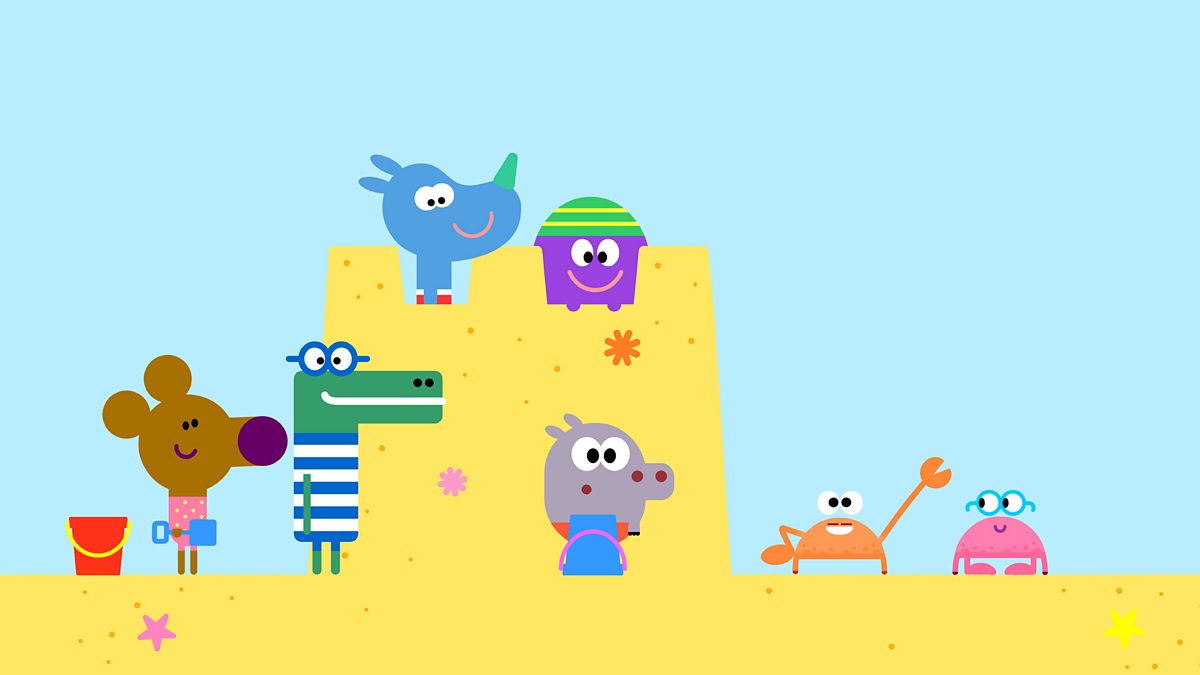
For the first eight months of my son’s life, he existed in a constant rush of activity, visiting different places and being introduced to different people. The world he had been born into, though as yet inchoate, was nevertheless a place he was lucky enough to find open for him. But then the pandemic hit – and so, just as the world was beginning to coagulate into something solid enough to persist when he stopped looking at it, it retracted to a tiny point: largely contained within the home, governed (as we attempted to juggle work and childcare) by an increasingly rigid system of routines.
For the first lockdown, my son was probably fine: he was still very young, and in hindsight it feels like it was over very quickly; he wasn’t isolated from anyone significant to him long enough to be terrified of them when he saw them again. But the winter lockdown hit us hard: after Christmas, illness and exhaustion within our bubble meant that we basically stopped seeing anyone at all – as we have emerged from it, my son has responded with suspicion and hostility to almost anyone we’ve seen (even his little friend Eliza, who he used to love to kiss on her big ginger head). He is far from the only young child to have been badly affected by the pandemic: beyond the anecdotal, there are emerging reports that the linguistic development of preschool-aged children has been seriously delayed. (My son is too young to quite gauge this in him: but what I would say is that before the second lockdown, it felt like he was gaining new words almost every day, and then after Christmas this just sort of stalled, and things are only starting to pick up again now).
Our society’s great fallacy, when it comes to child-rearing, is the belief that it ought to happen within the context of something called the ‘nuclear family’ – daddy, mummy, and babies, all packed together, apart from the rest of the world, in a private home. Having children immediately teaches you that this belief, which informs basically all public policy surrounding children and indeed property, is nonsense. Children need close, loving, reliable relationships with their primary caregivers. But they also need other people, other places, other experiences, if they are to learn and grow. They need to be constantly exposed to new things. But this is something that the pandemic (as per nuclear family-driven public policy) has made very difficult: it has locked the new away; with whatever justification, it has forbidden us from coming within more than a couple of metres of it.
And of course this is not just a problem for people who have, or are, young children. Everyone else, too, seems to be having trouble with the new. Lockdown, helped along by streaming services (and their algorithms) has led to a surge in people spending their time binge-watching old TV shows, with The Sopranos (1999–2007) and the US version of The Office (2005–2013) being two of the biggest lockdown hits. This Christmas, almost every store I went into had Friends (1994–2004) merchandise for sale in a prominent position on the shelves: merchandise clearly aimed, given what it was, at people who are currently the age I was, when the show first aired. Personally I found myself writing a lot about The Simpsons, the show around which my knowledge of the world first formed: the sort of work I usually do came to feel increasingly impossible, as I found myself unable to read, or think, about something, and be surprised.
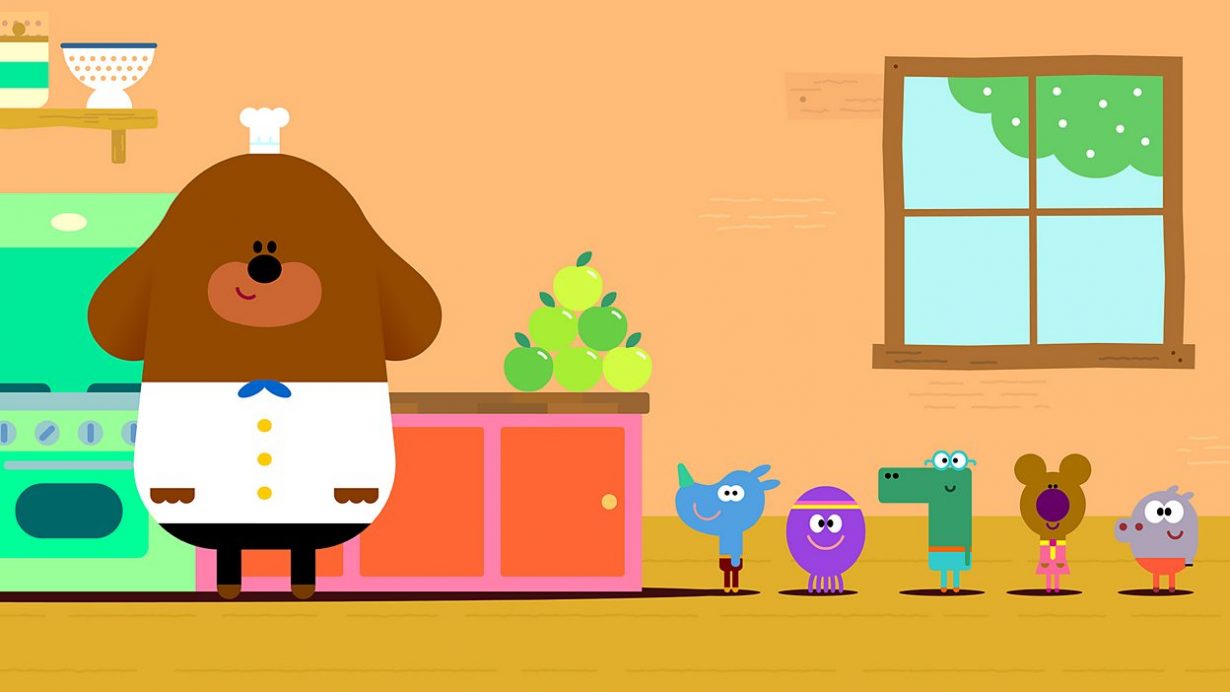
I understand, from what I see on social media or overhear, that a lot of people are anxious about the end of lockdown: that they hear about things ‘getting back to normal’, and they’re not sure how they’ll cope. I understand this, but as far as I’m concerned, if any of this is to be worth it, we need to find some way of de-atomising ourselves again. We need to find some way to re-acclimatise ourselves to the possibility of new things happening – and these things being not bad, like almost all the new things that seem to have been happening globally in recent years, but welcome.
But then the question is: how? I suppose my suggestion is that this could be a case of ‘where the danger lies, there the saving powers grows.’ The new episodes of Hey Duggee are terrifying, often viscerally so – precisely because they are new. But towards the end of the best of them, ‘The Senses Badge’, it is revealed that Duggee – having mastered all five ordinary senses – has developed a special, sixth one: the ‘Duggee Sense’, which allows him to always keep the Squirrels safe, as they explore the world with him.
The lesson, I think, is clear: security, such as it is, is never something we can obtain by retreating from the world, which will only leave us atomised: brittle, mutually suspicious, and alone. We need security – but we can only get it by embracing the world: by opening ourselves up, in our experience, to how it is. As the world thaws, we must strive – with care – to see as much as possible, hear as much as possible, smell as much as possible, and so forth: to exist with one another, charitable and attentive. In time, through this, our Duggee Sense will kick in. And so we can be at home in the new once more.
Tom Whyman is a philosopher and author of Infinitely Full of Hope: Fatherhood and the Future in an Age of Crisis and Disaster (2021, Repeater).
